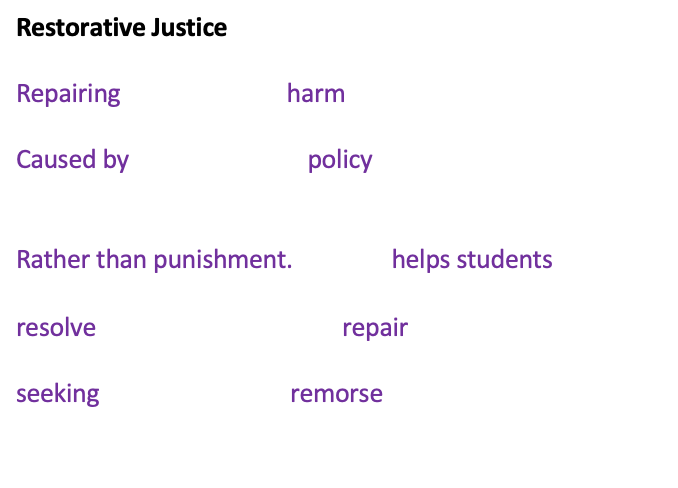My method with creating this poem was looking at a document that I took notes on and getting rid of unnecessary words and to create a poem out of it. When I took out some words I put together the remaining words. I used the space to spread out ideas that I thought were important. I was thinking about how many schools fail to use restorative justice instead of punishment when writing this. It made me feel angry because so many students of color are facing punishments over minor things like dress code. I also thought about how many students feel alienated and isolated in schools because of the punishments they’ve received. I learned that there are so many different interpretations of poetry. There is a lot of emotion in poetry and its the way you read it that allows you to feel that emotion. This assignment made me realize that there’s no right or wrong answer when interpreting Zong. It also made me realize that Zong has a lot throughout the poems that are related to the authors experiences in life.
The affects of the pressure on Walter as man of the house
-Angelica Santiago
In Lorainne Hansberry’s “A Raisin in the Sun” we see many hardships, such as financial issues and discrimination, between a family that identifies as African American. Those hardships affected every family member in different ways. One of the family members who was deeply affected was Walter because his relationship with his sister and others within the household and the way they view him is affected throughout the story. Walter had a dream to someday open up his own liquor store business. Walter is full of pressure throughout the story because he feels he needs to live up to being the man of his house just like his father was. Through her portrayal of Walter, Hansberry helps us understand that masculinity during this time period was important to be head of household.
Walter has always wanted better for him, and his family, but he has faced many challenges. Walter constantly tries to seek support from Mama, and his sister Beneatha. After he lost the money Mama gave him Walter lost hope and decides that maybe his family shouldn’t move into the new house. Walter says, “I’m going to look that son-of-a bitch in the eyes and say all right, Mr.Lindner that’s your neighborhood out there! You got the right to keep it like you want! Just write the check and the house is yours.” (Hansberry, 144). This shows how Walter has lost hope after losing the money and believes that taking the money Lindner gives his family will better the situation. He feels it’s better not to move into a neighborhood where his family isn’t welcomed. Mama constantly compares him to his father leaving him with the impression that he has to put his foot down and be a man and do what is right for his family.
Beneatha is one of few people who want Walter to be the man of the house. Walter’s actions have affected his relationship with his sister Beneatha and the way she views him. Beneatha grew anger towards him because she believes there’s no way for her to go to college and become a nurse. Beneatha felt like Walter crushed her dream. Beneatha states, “Yes just look at what the New World hath wrought! … Just look! There he is! Monsieur le petite bourgeois noir – himself! There he is – Symbol of a Rising Class! Entrepreneur! Titan of the system! Did you dream of yachts on Lake Michigan, Brother? Did you see yourself on that Great Day sitting down at the conference table, surrounded by all the mighty bald-headed men in America? All halted, waiting, breathlessly, waiting for your pronouncements on industry? Waiting for you – Chairman of the Board.” (Hansberry, 138). Beneatha uses words like” Petite bourgeois noir”, which means small middle class black man, to insult him and make him feel bad about himself. Beneatha’s decision to use those words proves that she has high expectations of him being the masculine head of household figure, Beneatha mocks Walter and is angry with him over losing the money. Beneatha’s actions were childish in a way because when someone is at their lowest, it’s best to be there for them and support them to the best of your ability. I think this is one of the reasons why Walter lost hope because he didn’t have a support system. All Beneatha ever did was point out the negative Walter has done.
Mama is one of the main people who expect Walter to be the man of the house and own up to his actions. Walter changes his mind after he sees how Mama reacts. Mama said, “Son- I come from five generations of people who was slaves and sharecroppers- but ain’t nobody in my family never let nobody pay’em no money that was telling us we wasn’t fit to walk the earth. We ain’t never been that poor. We ain’t never been that- dead inside.” (Hansberry, 143). This proves that Mama felt hurt with Walter’s thoughts on moving. Walter explains “Hell, yes, I want me some yachts someday! Yes, I want to hang some real pearls ‘round my wife’s neck. Somebody tell me, who decides which women is supposed to wear pearls. I tell you I am a man- and I think my wife should wear some pearls in this world.” (Hansberry, 143). This shows that Walter came to the realization that maybe he should stop trying to get pity from others and put his foot down. Walter then wants to talk to Lindner and ends up calling him and telling him to come to the house. He explains to Lindner, “And we have decided to move into our house because my father- my father- he earned it for us brick by brick. We don’t want to make no trouble for nobody or fight no causes, and we will try to be good neighbors. And that’s all we got to say about that. We don’t want your money.” (Hansberry, 148). This shows how Walter finally reached his “manhood” and did what was right for his family. If he didn’t go through those challenges, he wouldn’t have realized how much his family deserves to move into a new house. Beneatha is happy with how Walter took action. Beneatha states, “That’s what the man said.” (Hansberry, 148). This proves that Beneatha’s view on Walter has changed. She went from seeing him as a “tooth less rat” (Hansberry, 144). to a “man” (Hansberry, 148). Throughout the story Walter’s actions has affected his relationship with Mama and Beneatha and their view of him as a man. Walter stands up to Lindner is an example of how “head of the household” should be when it comes to family.
Discussion questions:
- Did the challenges Walter face help him reach his “manhood”? Why or why not?
- Do you think Walter made the right decision for his family? Why or why not? What would you have done differently? Explain.
Works Cited
Hansberry, Lorraine. A Raisin in the Sun. New York: Vintage, 1994. Print.
Hi, I’m Angelica.
I am a Childhood/Early Childhood Education major. I am from The Bronx, NY. I enjoy working with kids. I’m looking forward to ending the semester.

